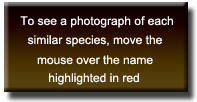
 |
|
|
Leucania insueta is a distinctive species. Its only close sibling is the closely related Leucania comma, a European species introduced into Newfoundland. Compared to eastern populations of insueta, comma is grayer and the veins are less heavily accented with light brown. The hindwing is completely, not partially, suffused with gray-brown.
Leucania insueta Guenee Diagnosis:
Distribution: Leucania insueta occurs throughout most of the United States and southern Canada except for the southeastern and south-central United States. The northern range stretches from Newfoundland in the east to southeastern Alaska in the west. Identification Quality: The relationships between insueta and the Old World species Leucania comma and between insueta and its western populations are unclear. There significant differences among all of them in superficial appearance but the male and female genitalia are similar in all cases. The differences between the typical eastern insueta and its western populations seem to follow a clinal variation. Conceivably the populations of inseuta are all races of the Old World Leucania comma. Alternatively insueta may represent a group of related New World species. Both the eastern insueta and the European comma occur at the same localities in Newfoundland. It would be very intresting to seek natural hybrids between the two "species" at these localities. The name insueta refers specifically to northeastern North American populations. Numerous other synonyms are available for western populations. Habitat: Widely distributed, but no specific information on habitat is available. Foodplants: Bromus sp., Agropyron repens, Dactylis glomerata (all Poaceae)* (Godfrey, 1972, U.S. Department of Agriculture Technical Bulletin, 1450: 95.) * lab reared, possibly not a natural foodplants. Larval Description: Godfrey, 1972, U.S. Department of Agriculture Technical Bulletin, 1450: 94, fig. 233. PDF not entered
|
Leucania insueta
Similar Species: Leucania insueta |
Similar Species |
 |
